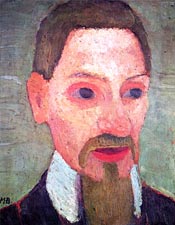Rainer Maria Rilke, born René Karl Wilhelm Johann Josef Maria Rilke on 4 December 1875 in Prague, Bohemia (then part of Austria-Hungary), was a notable Austrian poet and novelist. His early life in Prague was overshadowed by his mother’s mourning for an earlier infant daughter who died within a week of birth. He also experienced a strained relationship with his father, a former military man turned railway official.
Rilke was initially educated in a military academy, a path he abandoned due to ill health. He later pursued literature and art history studies in Prague and Munich. He experienced an intellectual transformation in his early twenties when he met, and fell in love with, Lou Andreas-Salomé in Munich. She influenced him to change his first name to ‘Rainer’ and introduced him to Russian culture.
Rilke’s literary work, characterised by its expressive style includes major poetic works, a novel, and numerous letters. He travelled extensively across Europe, with significant stays in Russia, Germany, and France, where he associated with notable cultural figures including Leo Tolstoy and Auguste Rodin.
In 1900, Rilke stayed at the Worpswede artists’ colony, where he met proto-expressionist painter Paula Modersohn-Becker, and the sculptor Clara Westhoff, whom he married in 1901. Their daughter Ruth was born in December 1901. He later travelled to Paris in 1902 to write a monograph on the sculptor Auguste Rodin. In the latter part of that decade, Rilke spent extended periods in Ronda, a renowned bullfighting centre in southern Spain.
During 1911/1912, Rainer Maria Rilke commenced the ‘Duino Elegies’ at Duino Castle near Trieste, inspired by nature and El Greco's art. The outbreak of World War I caught Rilke by surprise. He was unable to return to Paris, where his property was confiscated and auctioned. He then spent the greater part of the war in Munich.
In 1919 Rilke travelled from Munich to Switzerland. He met Polish-German painter Baladine Klossowska, whom he stayed with until his death in 1926. During a feverishly productive period of a few weeks in early 1922, Rilke finalised the ‘Duino Elegies’ and also composed the two segments of the ‘Sonnets to Orpheus’, encompassing 55 complete sonnets. These works are frequently regarded as the pinnacle of Rilke's literary achievements. In May 1922, his benefactor, Werner Reinhart, acquired and refurbished the Château de Muzot enabling Rilke to reside there rent-free.
Rilke died from leukaemia on 29 December 1926 in the Valmont Sanatorium in Switzerland. His remains were interred in Raron, Switzerland.
More by this author
